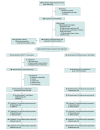Effect of the Family-Centered Advance Care Planning for Teens with Cancer Intervention on Sustainability of Congruence About End-of-Life Treatment Preferences: A Randomized Clinical Trial
- PMID: 35819787
- PMCID: PMC9277499
- DOI: 10.1001/jamanetworkopen.2022.20696
Effect of the Family-Centered Advance Care Planning for Teens with Cancer Intervention on Sustainability of Congruence About End-of-Life Treatment Preferences: A Randomized Clinical Trial
Abstract
Importance: The effect of pediatric advance care planning (pACP) on the sustainability of end-of-life treatment preference congruence between adolescents with cancer and their families has not been examined.
Objective: To evaluate the longitudinal efficacy of the Family-Centered Advance Care Planning for Teens with Cancer (FACE-TC) intervention to sustain adolescent-family congruence about end-of-life treatment preferences.
Design, setting, and participants: This multisite, assessor-blinded, randomized clinical trial enrolled adolescents with cancer (aged 14-21 years) and their family members from 4 pediatric hospitals between July 16, 2016, and April 30, 2019. Participants were randomized 2:1 to FACE-TC (intervention group) or treatment as usual (control group) and underwent 5 follow-up visits over an 18-month postintervention period. Intention-to-treat analyses were conducted from March 9, 2021, to April 14, 2022.
Exposures: Adolescent-family dyads randomized to the FACE-TC group received 3 weekly 60-minute sessions consisting of the discussion and/or completion of the Lyon Family-Centered Advance Care Planning Survey (session 1), Respecting Choices Next Steps pACP conversation (session 2), and Five Wishes advance directive (session 3). Dyads in the control group received treatment as usual. Both groups received pACP information.
Main outcomes and measures: Congruence was measured by completion of the Statement of Treatment Preferences (a document that discusses 4 hypothetical clinical situations and treatment choices for each scenario: continue all treatments, stop all efforts to keep me alive, or unsure) after session 2 (time 1) and at 3 months (time 2), 6 months (time 3), 12 months (time 4), and 18 months (time 5) after intervention. The influence of FACE-TC on the trajectory of congruence over time was measured by longitudinal latent class analysis.
Results: A total of 252 participants (126 adolescent-family dyads) were randomized. Adolescents (mean [SD] age, 17 [1.9] years) and family members (mean [SD] age, 46 [8.3] years) were predominantly female (72 [57%] and 104 [83%]) and White individuals (100 [79%] and 103 [82%]). There was an 83% (104 of 126) retention at the 18-month assessment. Two latent classes of congruence over time were identified: high-congruence latent class (69 of 116 [60%]) and low-congruence latent class (47 of 116 [41%]). The dyads in the FACE-TC group had a 3-fold odds of being in the high-congruence latent class (odds ratio [OR], 3.22; 95% CI, 1.09-9.57) compared with the control group. Statistically significant differences existed at 12 months (β [SE] = 1.17 [0.55]; P = .03]) but not at 18 months (OR, 2.08; 95% CI, 0.92-4.69). In the high-congruence latent class, good agreement (agreement on 2 or 3 of 4 situations) increased over 12 months. White adolescents and families had significantly greater odds of congruence than a small population of American Indian or Alaska Native, Asian, Black or African American, Hispanic or Latino, or multiracial adolescents and families (OR, 3.97; 95% CI, 1.07-14.69).
Conclusions and relevance: Results of this trial showed that, for those who received the FACE-TC intervention, the families' knowledge of their adolescents' end-of-life treatment preferences was sustained for 1 year, suggesting yearly follow-up sessions. Race and ethnicity-based differences in the sustainability of this knowledge reflect a difference in the effect of the intervention and require further study.
Trial registration: ClinicalTrials.gov Identifier: NCT02693665.
Conflict of interest statement
Figures


References
Publication types
MeSH terms
Associated data
Grants and funding
LinkOut - more resources
Full Text Sources
Medical
Miscellaneous

